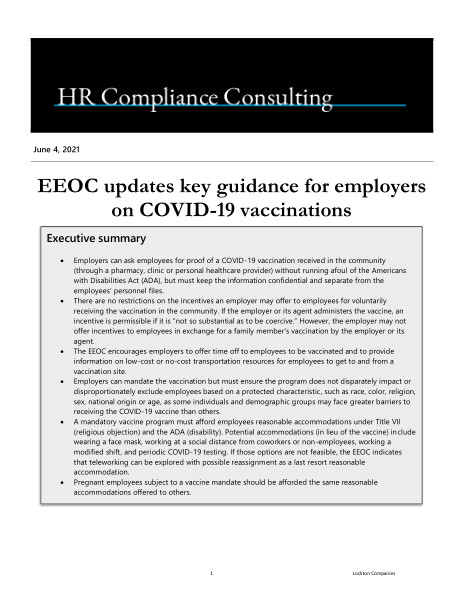Executive summary
Employers can ask employees for proof of a COVID-19 vaccination received in the community (through a pharmacy, clinic or personal healthcare provider) without running afoul of the Americans with Disabilities Act (ADA), but must keep the information confidential and separate from the employees’ personnel files.
There are no restrictions on the incentives an employer may offer to employees for voluntarily receiving the vaccination in the community. If the employer or its agent administers the vaccine, an incentive is permissible if it is “not so substantial as to be coercive.” However, the employer may not offer incentives to employees in exchange for a family member’s vaccination by the employer or its agent.
The EEOC encourages employers to offer time off to employees to be vaccinated and to provide information on low-cost or no-cost transportation resources for employees to get to and from a vaccination site.
Employers can mandate the vaccination but must ensure the program does not disparately impact or disproportionately exclude employees based on a protected characteristic, such as race, color, religion, sex, national origin or age, as some individuals and demographic groups may face greater barriers to receiving the COVID-19 vaccine than others.
A mandatory vaccine program must afford employees reasonable accommodations under Title VII (religious objection) and the ADA (disability). Potential accommodations (in lieu of the vaccine) include wearing a face mask, working at a social distance from coworkers or non-employees, working a modified shift, and periodic COVID-19 testing. If those options are not feasible, the EEOC indicates that teleworking can be explored with possible reassignment as a last resort reasonable accommodation.
Pregnant employees subject to a vaccine mandate should be afforded the same reasonable accommodations offered to others.
__________________________
Nearly six months after its initial guidance related to the COVID-19 vaccination, the Equal Employment Opportunity Commission (EEOC) has supplemented and clarified that initial guidance with a series of important frequently asked questions. Of particular interest to employers are the EEOC’s explanations of the circumstances under which employers may require an employee to be vaccinated, and the permissibility of vaccination incentives. The details can be found here at Section K.
Lockton comment: Keep in mind that this guidance does not have the force of law; rather, it sets forth the EEO standards as they relate to the vaccinations in the context of the workplace (although courts may find the guidance persuasive). Other federal, state or local laws may offer employees additional protection so be sure to consider all applicable laws when implementing a vaccine-related program.
Confirming what employers can ask
Employers can ask employees for proof that they received the COVID-19 vaccine in the community – at a pharmacy, clinic or personal healthcare provider – but must keep the information confidential. Asking an employee for proof of the vaccination from a third party is not a “disability-related inquiry” protected by the ADA as the question is not likely to disclose the existence of a disability. The EEOC notes that there are many reasons besides a disability for which an employee may not provide documentation of vaccination.
Lockton comment: Many employers also want to know if they can ask prospective employees whether they’ve been vaccinated. While not specifically addressed in the recent guidance, the EEOC’s rationale with respect to asking current employees for proof of the vaccine would support that inquiry of prospective employees as well.
Time off for employees to be vaccinated is encouraged
The EEOC encourages employers to provide time off to employees to be vaccinated and assist those without reliable internet access to identify nearby by vaccination locations. Noting that transportation may not be readily available to employees outside of working hours, the EEOC also recommends employers provide employees with information on low-cost or no-cost transportation options to vaccination sites.
Vaccine incentives may or may not be permissible
Employers may offer employees incentives to be vaccinated, but the size of a permissible incentive depends on where the employees receive the vaccine. Incentives are permissible for voluntary vaccine programs. In determining the permissible size of the incentive, the big distinction drawn by the EEOC is whether the employee is vaccinated “in the community” or administered the vaccine through the employer or its agent. If the latter, an incentive is permissible if it is “not so substantial as to be coercive.” In this context, the EEOC states that the vaccine prescreening questions are a disability-related inquiry, and a very large incentive could make employees feel pressured to disclose protected medical information, rendering a voluntary vaccination program effectively involuntary. Sadly, the EEOC does not define “substantial.”
On the other hand, when an employee is vaccinated outside of the employer or its third party, there is no disability-related inquiry by the employer so there are no concerns about the size of the incentive.
Lockton comment: For employers, choosing which type of voluntary vaccination program to implement will be a matter of risk tolerance. The safe bet – particularly where the employer wants to provide an incentive – is for employees to be vaccinated in the community, but the convenience of an on-site program administered by the employer or its agent may provide greater turnout. It is difficult to determine what the EEOC may view as “substantial” in the context of an incentive, but it certainly seems that it is something more de minimis than a water bottle. Given the voluntary paid leave provisions of the American Rescue Plan Act and other state and local laws that mandate paid leave for the COVID-19 vaccine, it seems that some form of paid time off as an incentive would not be viewed as “substantial” or “coercive,” but the EEOC declined to expressly state so.
Be careful with incentives for family member vaccinations
Although we think few employers would do so, employers can offer employees an incentive to provide documentation that their family members received the vaccine in the community. However, no incentive can be offered for an employee’s family member to be vaccinated by the employer or its agent, as the pre-vaccination screening process will implicate the Genetic Information Nondiscrimination Act (GINA), which prohibits employers from providing incentives in exchange for genetic information, including family medical history. The rationale is that the prescreening questions asked of an employee’s family member would effectively provide the employer with the employee’s family medical history.
Employers can still offer vaccinations to an employee’s family members absent any incentive if certain requirements are met, including:
The program is voluntary, with no penalties for non-participation
All medical information obtained is kept confidential
The family member provides prior, knowing, voluntary and written authorization before being asked the prescreening questions
Vaccine mandates are lawful for employees returning to the workplace if reasonable accommodations are provided
An employer may require that all employees physically entering the workplace be vaccinated. The EEOC reiterates that federal EEO laws do not prevent an employer from mandating that all employees entering the workplace be vaccinated, subject to providing reasonable accommodation to employees who are not vaccinated on account of a disability, sincerely held religious belief or pregnancy. In those instances, the employer must provide a reasonable accommodation (absent undue hardship) in compliance with the ADA and Title VII.
Vaccine policies requiring employees to get the COVID-19 vaccination from the employer or its agent must comply with the ADA’s restrictions on the employer’s disability-related inquiries or medical examinations of its employees. While the act of administering the vaccine is not a medical examination, the pre-vaccination screening questions may elicit medical or disability-related information and, therefore, implicate the ADA. In this context, to ask the pre-vaccination screening questions, the employer must have a reasonable belief based on objective evidence that an employee who does not answer the screening questions (and therefore won’t be vaccinated) will pose a “direct threat” to the employee’s own health and safety and that of others. If challenged by an employee, the employer would need to justify these inquiries under the ADA.
The easiest way to avoid this potential hurdle is to either offer vaccines on a voluntary basis (so that the employee may choose whether or not to answer the screening questions) or recommend or arrange to have the employee vaccinated in the community through a pharmacy, clinic or personal healthcare provider.
A vaccine policy should notify employees of reasonable accommodations
While some employers with a COVID-19 vaccination policy mandating or incentivizing the vaccine were hesitant over the past few months to expressly identify an accommodation process within the policy, the EEOC now states it is a “best practice” for employers to do just that. A COVID-19 vaccination policy, under which the employer either requires or incentivizes employees to obtain the vaccine, should expressly state that the employer will consider requests for reasonable accommodations when a disability, religious belief or pregnancy precludes the employee from being vaccinated. As with other accommodation requests, the employer may need to obtain supporting medical documentation about the employee’s disability. The EEOC directs employers to consult the Job Accommodation Network (opens a new window) and OSHA COVID-specific (opens a new window) resources during the accommodation process.
The EEOC also identified potential reasonable accommodation in the case of a religious objection, disability or pregnancy as:
Wearing a mask
Working at a social distance from coworkers or non-employees
Working a modified or staggered shift
Periodic COVID-19 testing
Teleworking
Reassignment
Lockton comment: Be sure that the managers and supervisors communicating with employees about any vaccine requirement can recognize an accommodation request. Note also that an employer cannot disclose to others that an employee is receiving a reasonable accommodation and cannot retaliate against an employee seeking a reasonable accommodation.
Even fully vaccinated employees may be entitled to reasonable accommodations in the workplace. The new EEOC guidance also stresses that even fully vaccinated employees may request an accommodation for a disability due to a continuing concern of heightened risk of severe illness from COVID-19. For instance, persons who are immunocompromised might still seek a reasonable accommodation. If that occurs, employers should engage in the interactive process to determine if there is a disability-related need for reasonable accommodation and process that request as any other request for an ADA accommodation.
If mandating the vaccine, employers need to account for potential barriers facing certain employees
The EEOC notes that some individuals and demographic groups may face greater barriers to receiving the COVID-19 vaccine than others so employers should ensure that a vaccine program does not disparately impact or disproportionately exclude employees based on any protected characteristic (race, color, religion, sex, national origin or age).
Takeaways
The new guidance should alleviate concerns about offering incentives to employees vaccinated in the community, given the absence of any constraints on those incentives. Employers can ask employees about their vaccination status without fear of violating federal EEO laws as long as the employees’ answers are kept confidential. Once the employer identifies the percentage of fully vaccinated employees, the employer can make an informed decision whether to offer employees an incentive to be vaccinated in the community or through an employer-administered vaccine program, although incentives for the latter are subject to limits. One practical consideration is how to respond to employees who are already vaccinated; will the incentive be offered to them as well to reward their past actions?
While this new EEOC guidance provides employers with some clarity on lingering questions related to the COVID-19 vaccines, some undecided and uncharted territory still exists. We  View alert (opens a new window)that employers continue to reach out to counsel with questions.
View alert (opens a new window)that employers continue to reach out to counsel with questions.
Not legal advice: Nothing in this alert should be construed as legal advice. Lockton may not be considered your legal counsel, and communications with Lockton's HR Compliance Consulting group are not privileged under the attorney-client privilege.


